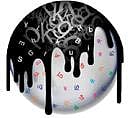At many a juncture in my life, I have found myself utterly confounded by the process of evolution and growth. One such moment occurs now, as I stare hard at a quote that someone has shared on Facebook.
It is by Canadian writer Mark Abley and describes modern English as the walmart of languages — “convenient, huge, hard to avoid, superficially friendly, and devouring all rivals in its eagerness to expand.”
All around us Indian languages are dying more quickly than you can utter the words “our multilingual heritage.” I ask myself, as a modern Indian who is more comfortable in English than in my mother tongue, am I a victim of this trend or its perpetrator?
How and why does a language die? Is it the aggression of another language that kills it or its own inherent weakness, that brings about its demise? Or do languages just fall by the wayside on the super expressway to globalisation, and nobody quite knows when or how they get crushed under the wheels of progress?
Linguists are crying themselves hoarse about the rate at which language erosion in India is taking place. During the first half of the 20th century, India reportedly lost about one-fifth of its languages. During the second half of the last century, we have lost about one-third of the remaining languages. It is a case of the big fish eating up the small and then in turn getting eaten up by yet bigger fish. First the dominance of languages, like Hindi, Marathi, Bengali or Tamil suppressed the minor languages and now the major languages themselves are falling prey to English.
Surrounded by Bollywood and our robust regional cinemas and ubiquitous film song lyrics, few of us even realise that we are only partially literate in our mother tongues. The fact came home to me recently, when a friend loaned me a Hindi classic by the author Shivani to read, having heard me enthuse about Shivani many times.
When I was in school, my daily route from home to school included cycling past her house and feeling full of awe at that simple circumstance. Both my mother and I were devoted Shivani fans and I recall having no problems in reading her novels or stories when I was younger. However, with this book I failed to get past the first few pages. Somewhere in the decades between school and now, I had lost my bilingualism.
I realised with dismay that though I speak the language, I can no longer navigate its script with any degree of ease. And I am no oddity, a significant section of my generation is similarly placed and the next generation has very rudimentary skills, if any, with the written word in their mother tongue.
So perhaps, the time has come to bid goodbye to our regional literatures for what literature can thrive, when knowledge of the script leaves the general population and becomes the limited preserve of a few scholars? Historical experience in India shows that languages without scripts were among the first to disappear.
On the other hand, those with the strongest written traditions became the dominant languages, with the political divisions of states, also being done around those languages. Now as our dominant scripts fall into disuse what future can we envisage for the literature in these languages? Globalisation brings in its wake common currencies like the Euro and more accommodating entry rules like the Schengen visa. Can this stretch to languages? Do the 26 letters of the Roman alphabet have the potential to capture the richness and diversity of all our regional languages and ensure their survival, past the death of the original scripts?
To me, it seems very unlikely. What seems more likely is that our languages will lose their nuances, their particular syntax and grammars, their breadth and range and unique beauty and become more and more like each other. Over time perhaps the nation will flow in a common Inglish, its waters turbid with many words from the regional tongues and its spelling ‘4got10’ n ‘replcd by txting’.
Mercifully, I will not be here to mourn this eventuality. On January 26, 2010, the Bo language of the Andaman Islands became extinct, when its last speaker died. While there were obituaries for its death in some national and international newspapers, there were no mourners.
There was no one left to remember what the language was and feel its loss. The irony of this is worth dwelling upon. If at all we want to even mourn the death of our languages, we’d better pre-pone it to now, later it might be too late.
I don’t think there will ever be easy or ready answers to the issue of how much globalisation or growth is good for us or to what exactly it does to our cultures, our literatures, our values or our unique sensibilities — for globalisation both takes and gives at the same time.
It expands us in some ways and contracts us in others, empowers us in places, depletes us in others. However, it is extremely important that we at least begin to ask ourselves the right questions, count the costs, factor in the losses. And by ‘we’ I mean you and me and not everyone’s favourite scapegoat or whipping boy — the government. Of course, it is very easy to argue that the national language policy is all wrong or de-cry the lack of foresight on the part of government but our elected governments can’t really impose policies on us, which go contrary to our expressed preferences.
In fact, we do not even need the government to save our languages for us. There is enough techno wizardry and magic in this internet fuelled, inter-connected and multimedia-enhanced world to buttress our language capabilities in new and exciting ways. But, for that to happen, first, we must feel the need and express a choice.

